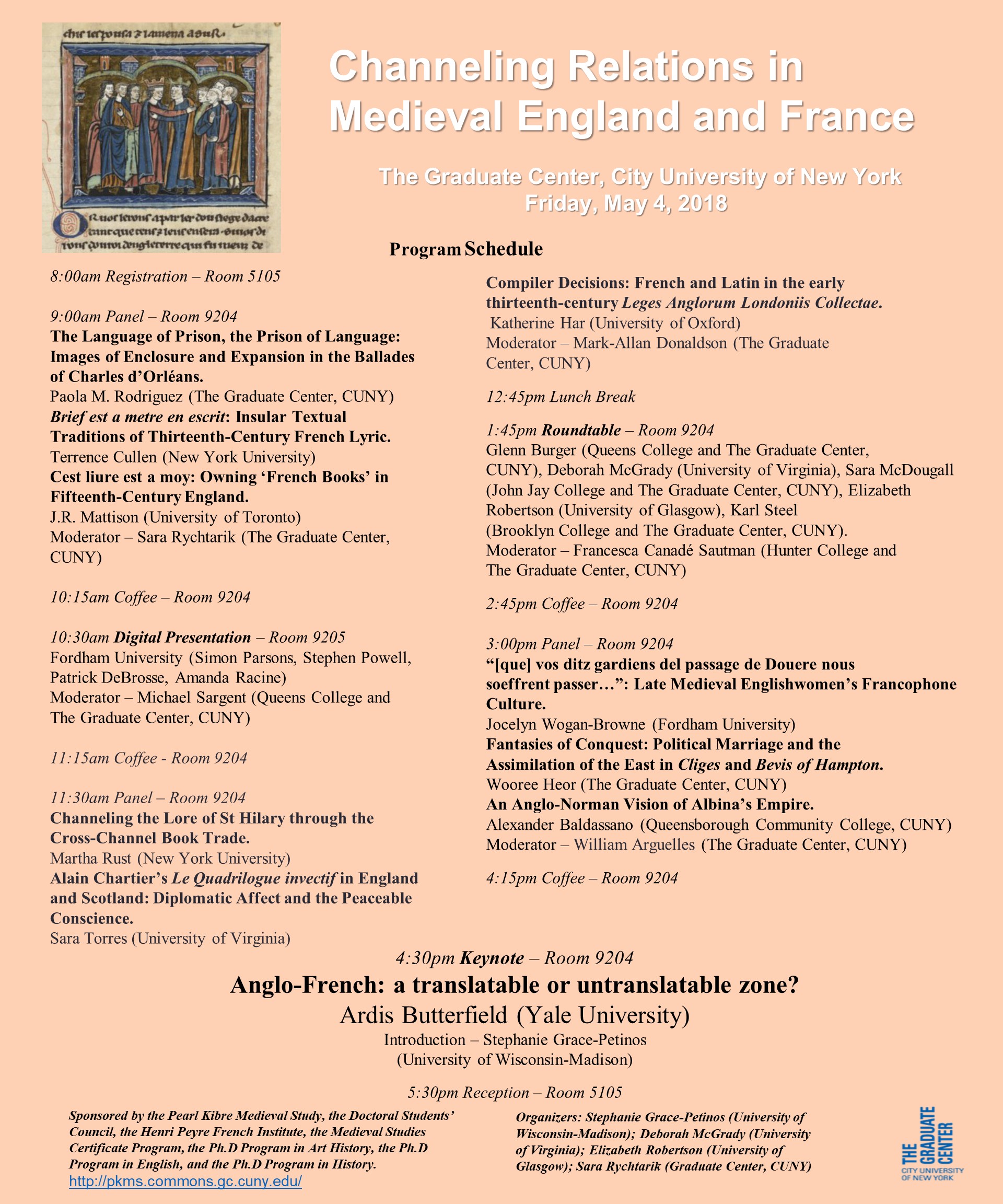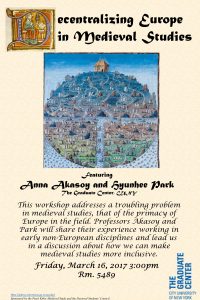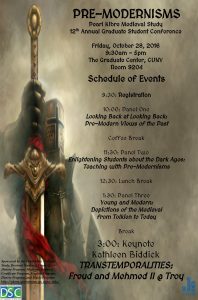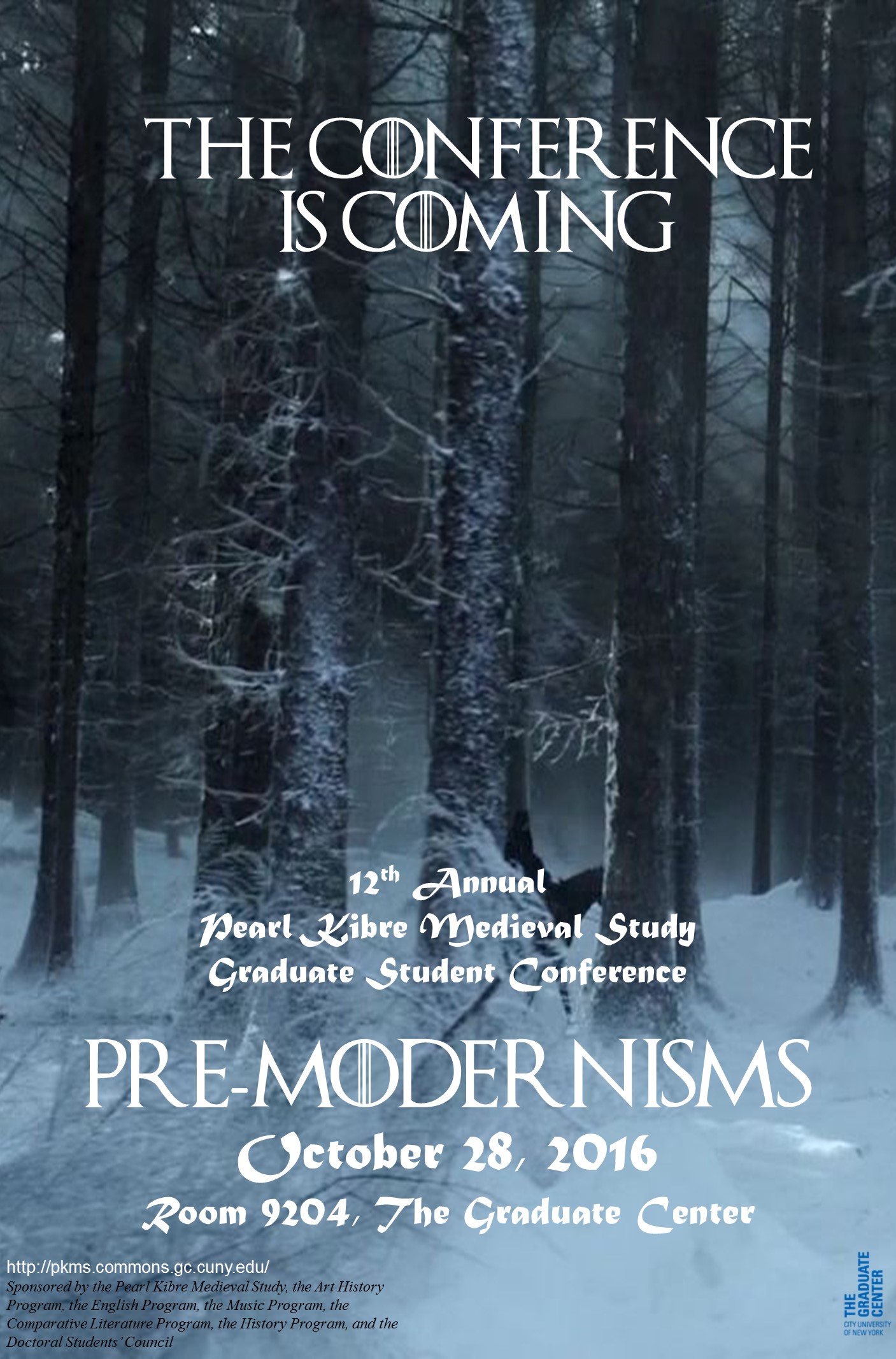Home » Articles posted by Jennifer Alberghini
Author Archives: Jennifer Alberghini
Jennifer Alberghini, English
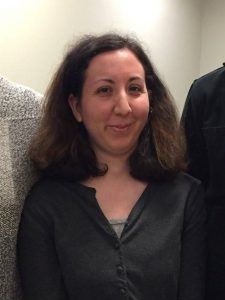 Research Interests: Medieval gender, marriage, and family, Chaucer, Gower, romance, and hagiography, translation
Research Interests: Medieval gender, marriage, and family, Chaucer, Gower, romance, and hagiography, translation
Jennifer is a Writing Across the Curriculum Fellow at Queensborough Community College, and teaches at Queens College and Marymount Manhattan College. She defended her dissertation, “Divided Loyalties: Family and Consent to Marriage in Late Middle English Literature, 1300-1500” on May 18, 2018.
Her paper “Matriarchs and Mother Tongues: The Middle English Romans of Partenay” appeared in the volume Melusine’s Footprint: Tracing the Legacy of a Medieval Myth (Brill 2017).
She served as the co-chair of PKMS from 2015-2018.
Email: jalberghini@gradcenter.cuny.edu
CFP for 2019 Kalamazoo
Exchanging Cultures: Anglo-French Relations in the Middle Ages
Scholars agree that English and French, whether language, literature, or culture, had a strong relationship in the Middle Ages. Despite their mutual interactions and back-and-forth distribution of power, the portrayal of the relationship has remained fairly static, frequently described as French influence on English writing but not the other way around. Rather than a unidirectional influence, however, we should perhaps consider the relationship to be one of exchange. How might English ideas have influenced French ones? How might both peoples have viewed each other on a day-to-day level?
Because of traditional departmental divisions, it is difficult to satisfactorily answer these questions in a manner which incorporates both perspectives. Furthermore, there is a deep separation between lines of inquiry discussed by scholars in English and those discussed by scholars in French. Influenced by Channeling Relations in Medieval England and France, the conference hosted by the Pearl Kibre Medieval Study in 2018 which featured pioneers in the field Ardis Butterfield and Jocelyn Wogan-Browne, this panel aims to bring together these two traditionally separate groups for a conversation that is truly interdisciplinary.
While this panel focuses on literary and cultural exchanges between England and France, we welcome submissions that also incorporate other perspectives, particularly non-western.
Please submit abstracts to Steve Kruger at [email protected]
CFP 2018 Conference Channeling Relations in Medieval England and France
Organizers: Stephanie Grace-Petinos (University of Wisconsin-Madison); Deborah McGrady (University of Virginia); Elizabeth Robertson (University of Glasgow); Sara Rychtarik (Graduate Center, CUNY)
Date: May 4, 2018
Location: CUNY Graduate Center
This event is hosted by Pearl Kibre Medieval Study at the CUNY Graduate Center
For medievalists, interdisciplinary work has always been a necessity, and our major annual conferences reflect this need to broaden our understanding of the dynamic and widespread time period. While medieval scholars may specialize in one area of medieval studies, they also understand that separating traditions – by culture, language, religion, geographic borders, etc. – can create a limited and narrow understanding of the Middle Ages. This is especially the case for medievalists who study medieval England and France. Although, or perhaps because, they were frequently engaged in war, these two countries had many rich literary and cultural exchanges over the course of the Middle Ages. For Middle English scholars, French literature and music are often valuable resources for the sources of the works of popular authors such as Geoffrey Chaucer, and so are often read in medieval English classes. Yet why is Chaucer not routinely read in French departments? Or, on the other side, medieval English texts, law, as well as literature, were often written in French, not English. But British literature survey courses often limit their coverage of the Anglo-French corpus to one or two lais of Marie de France.
This one-day conference offers the opportunity for scholars, whether they usually preserve or cross departmental lines in their own work, to come together with scholars from departments with whom they may not routinely discuss academic work/research/approaches. While this conference focuses on literary and cultural exchanges between England and France, we are not discounting other traditions and welcome submissions for individual papers or full panel proposals that also incorporate other perspectives, particularly non-western.
Topics to be discussed can include, but are by no means limited to:
– A text that belongs to both the English and French traditions
– A text, legend or corpus of characters that exist with variations in each tradition
– A textual theme shared by both traditions
– A historical event that occurred in both traditions (i.e. The Hundred Years War)
– Religious orders or religious figures prominent in both England and France
– Historical or literary figures that travel throughout England and France
– French texts that circulate within England; English texts that circulate within France; English and/or French texts that circulate within both England and France
Please send abstracts of 250 words to [email protected] by December 31, 2017.
Teaching the Middle Ages Workshop Documents and Resources
Lesson Plan Workshop with Paola Ureni
Points to consider:
Connect to our time for student interest
Medieval and Now shares common ideas (mind, soul, individual, etc.)
Greater complexity in those concepts for Medieval
Helpful links
http://medievalhighered.omeka.net/
This site is a collection of materials for teaching medieval classes. Particularly recommended is the Medieval or Modern questionaire. (Note: may require registration).
https://globalchaucers.wordpress.com/
A blog which explores the impact of Chaucer’s works around the world. Includespedagogical ideas and resources, such as “Teaching the Wife of Bath through Adaptation.”
Useful texts (not necessarily medieval)
“Why Read the Classics” Italo Calvino http://www.nybooks.com/articles/1986/10/09/why-read-the-classics/
Jeffrey Jerome Cohen “Monster Culture (Seven Theses)”
For teaching the Gothic
Eve Sedgwick The Coherence of Gothic Conventions (used with Scooby-Doo episodes)
Writing instruction materials
Sample syllabi
Sample lesson plans
lessonplanjephthahsdaughterlessonplanonchaucerandplagiarism lesson plans – lanval and the wanderer Beowulf OE guidelines
https://www.cynthiarogers.info/game-of-love-handout
Stay tuned for information about our final workshop of the semester.
Conference Full Schedule with Participants
9:30: Registration
10:00: Panel One | Looking Back at Looking Back: Pre-Modern Views of the Past
Moderator: Alexander Baldassano, CUNY Graduate Center
Classicisms and Medievalisms in the Songs of Raimbaut de Vaqueiras
Clare Wilson, CUNY Graduate Center
Poking Holes in the Walls of the Patriarchy: The Pyramus and Thisbe Myth in Chaucer and Shakespeare
Jennifer Alberghini, CUNY Graduate Center
For Your Reference (and Reverence): Illustrated Relic Directories and German Media Theory for the Late Middle Ages
Christian Whitworth, Tufts University
Coffee Break
11:30: Panel Two | Enlightening Students about the Dark Ages: Teaching with Pre-Modernisms
Moderator: Allen Strouse, CUNY Graduate Center
Shame! Shame! Shame! Teaching Puritanism with The Game of Thrones
Christina Katopodis, CUNY Graduate Center
Introducing Witch Diction: An Investigation and Analysis of the Pedagogical Presentation of Witchcraft in the Undergraduate Historical Seminar Setting
Ryan Kelly, Eastern University
12:30: Lunch Break
1:30: Panel Three | Young and Modern: Depictions of the Medieval from Tolkien to Today
Moderator: Mary Jean McNamara, CUNY Graduate Center
Fighting the Past: Medieval Dragons in Children’s and YA Literature
Esther Bernstein, CUNY Graduate Center
Tolkien’s Unstable Machinery: The Lord of the Rings as Mimetic History
Micheal Angelo Rumore, CUNY Graduate Center
Compression Dangerous and Beautiful: Incest as Intimate Politics in Elizabeth E. Wein’s The Winter Prince
Rebecca Fullan, CUNY Graduate Center
Break
3:00: Keynote | TRANSTEMPORALITIES: Freud and Mehmed II @ Troy
Kathleen Biddick, Temple University
12th Annual PKMS Graduate Student Conference-Pre-Modernisms Preliminary Schedule
PRE-MODERNISMS
Pearl Kibre Medieval Study
12th Annual Graduate Student Conference
Friday, October 28, 2016
9:30am – 5pm
The Graduate Center, CUNY
Room 9204
Schedule of Events
9:30: Registration
10:00: Panel One
Looking Back at Looking Back:
Pre-Modern Views of the Past
Coffee Break
11:30: Panel Two
Enlightening Students about the Dark Ages:
Teaching with Pre-Modernisms
12:30: Lunch Break
1:30: Panel Three
Young and Modern:
Depictions of the Medieval
from Tolkien to Today
Break
3:00: Keynote
Kathleen Biddick
TRANSTEMPORALITIES:
Freud and Mehmed II @ Troy
A CFP of Possible Interest for Kalamazoo
Passing along for our colleagues at Rutgers:
Cultural and Literary Transmission in the Global Middle Ages (Kalamazoo 2017)
Sponsored by the Rutgers Program for Medieval Studies
Organizers: Izzy Stern and Erik Wade
Scholarship on the global Middle Ages has flourished in recent years, examining the role that a global community played in the medieval period. Such work demonstrates the remarkable links between various civilizations in the medieval period and the extent to which the Middle Ages truly were a hotbed of trade. Recent scholarship has considered the cultural interactions of trade, literary transmission, pilgrimage, religious conversion, explorers, colonization, and military expeditions. Building off of this work, this panel seeks to consider the role of intercultural interactions in the Middle Ages.
This panel seeks entries from all disciplines and invites applicants to interpret “interactions” broadly. Presenters may discuss literary interactions, military, exploratory, cultural, trade, political, religious, or anything else. Whether investigating the story of Abul-Abbas—the elephant given to the Carolingian Emperor Charlemagne by the Abbasid Caliph Harun al-Rashid—or the spread of coal-based iron production in eleventh-century China or the tenth-century journey of Ahmad ibn Fadlān from Baghdad through modern-day Uzbekistan and Kazakhstan to the camp of the Bulghār khan on the Volga river, papers may consider a variety of kinds of “interactions” in a globalized medieval period.
How did medieval writers and historians conceive of these interactions? How were these interactions recorded or remembered? How often was a particular story’s genealogy and foreign origins remembered, for example? What can we say about the trauma caused by these often violent interactions? How do these interactions help us reconceive of usually static terms such as “culture,” “country,” “nation,” and others? How did medieval people see themselves fitting in to the scale of the “global?” In modern depictions of the medieval world, how have these interactions been forgotten in the preservation of a white Middle Ages?
Please send questions, abstracts of 300 words, and participant information forms (http://www.wmich.edu/medievalcongress/submissions) to both Izzy Stern ([email protected]) and Erik Wade ([email protected]) by September 10.
CFP for 2017 International Congress on Medieval Studies, Kalamazoo, MI
CFP: Persecution, Punishment, and Purgatory I-II: Methodological Considerations, Historical Explorations
Sponsored by the Medieval Studies Certificate Program, Graduate Center, CUNY
52nd International Congress on Medieval Studies, May 11-14, 2017, Kalamazoo, MI
Societies and cultures shape themselves in part through a series of exclusions, and those exclusions may involve both individual punishment and the persecution of particular groups. Of course, medieval societies and cultures had their own distinct modes of exclusion, punishment, and persecution. R.I. Moore famously, if controversially, argued for the “formation of a persecuting society” in the Central Middle Ages; interestingly, the same moment sees (in Jacques LeGoff’s terminology) “the birth of Purgatory.” These panels consider these issues in two different directions: methodological, asking how we read the limited documentary evidence to understand the position of the persecuted, as well as the persecutor, and historically, looking at representations in a variety of documents (e.g. trial records, art, and literature) to consider these questions through disparate methodologies (Please specify which panel you are applying to).
Please send 250-word abstract and PIF to [email protected] by September 15, 2016.
Topics might include, but certainly are not limited to:
- the origins and uses of persecution
- the experience of religious and ethnic pogroms
- forced conversions and expulsions
- persecution as a method of socio-cultural nation and identity formation
- the character of legal and extra-legal punishment
- punishment as a form of discipline
- self-inflicted and devotional punishment
- the role of punishment in the family
- the variations of punishment based on class, status, and gender
- punishment as social control
- concepts of the afterlife
- the relationship between sin/punishment and the afterlife
- liminal spaces
- peripheries
Conference Livestreaming
To view a livestream of the conference, visit http://videostreaming.gc.cuny.edu/videos/
and click on the Medieval Graduate Student Conference.
Call for Papers for 11th Annual PKMS Graduate Student Conference
“Sanctity and Sinfulness: Hagiographical Studies in Memory of Tom Head”
11th Annual Pearl Kibre Medieval Study Graduate Student Conference
The Pearl Kibre Medieval Study, the CUNY Graduate Center’s student-run organization for medieval studies, announces its eleventh annual Graduate Student Conference at the CUNY Graduate Center on Friday, February 26, 2016. This year’s conference is dedicated to the work and legacy of Thomas Head. We invite grad students to submit proposals.
The conference will look at how saints and their cults and relics were used to support and/or oppose political ambitions; examine how members of the ecclesiastical and secular hierarchies attempted to balance a desire for God’s peace with the realities of lordship; and explore the patronage of saints, ideals of sanctity, and issues of episcopal influence and its effect on local saints.
Submit a 300-word abstract by December 14th to [email protected]
Topics may include, but are not limited to, the following:
-
Hagiography and hagiographers
-
Cults of saints
-
Ideals of sanctity
-
Peace and Truce of God
-
Secular appropriation of saints
-
Canonization and its process
-
Patronage of saints
-
Frankish lordship
-
Relics
-
Episcopal influence on local saints
We encourage papers to engage Tom’s scholarly legacy.
Publishing for Graduate Students: A Recap
PublishingforGraduateStudents Chad Turner’s comprehensive notes
Karl Steel’s Facebook post https://www.facebook.com/karl.steel/posts/10205622561577917
Panelists: Karl Steel, Associate Professor of English Literature at Brooklyn College and CUNY Graduate Center
Jennifer Ball Brooklyn College and CUNY Graduate Center
Moderator: Mary Catherine Kinniburgh
- Both panelists admitted to unusual first publication experiences: Karl Steel’s first article as a Master’s student was a translation of French travel literature from a West African who traveled to the Soviet Union; Jennifer Ball’s first publication was her book, which she completed in a post-doc
- Jennifer Ball never published in grad school, though from her experience on search committees, many more graduate students have publications on their resumes now.
- Other publications besides articles in peer-review journals are book reviews, book chapters, encyclopedia entries, catalogs [for Art History]
- Keep priorities–don’t let publishing distract from dissertation writing
- Karl Steel suggested, after chapters are complete, to take 7000 words of the bulk and submit (Standard journal articles are 6-7000 w0rds)
- Journal articles are “pithy,” (often stronger) arguments get straight to the point, more condensed that a book, not need to burden with background from the filed
- Recommended reading Writing Your Journal Article in Twelve Weeks Wendy Belcher, Getting It Published and From Dissertation to Book William Germano
- Book reviews: less important than other genres, suggested mainly if it’s useful to your work
- How to write a book review: describe the argument in 2-3 paragraphs, end discuss what would have liked to be in it, although for grad students, this should just be evaluation instead
- How to publish things: people ask; conference networking is important(Often writing projects can be solicited by others as one becomes known in the field)
- For articles, don’t meander, have a strong central argument; shouldn’t feel like a seminar paper
- Why an article might be rejected: argument doesn’t hold up because of incorrect facts, weak writing (lacks clarity or organization)
- blog posts–not as popular as used to be, but still useful for writing, get people to read things
- Reading your paper like a blog post is a good way of gauging how readers might react
- Writing groups are useful, having both insiders and outsiders read it
- Karl Steel suggests writing for 15-20 minutes a day (or banking that time for longer sessions)
- Getting straight to the point with articles–start with an anecdote
- Editing other people’s work will help you in your own work (as well as helping them)
- If your professor tells you that you should publish something, you should take their advice on revisions and submit it
- Conference questions help expand your argument, can be included in drafts
- Mostly contraction is necessary for revision; focus in on your central argument
- Publishing early doesn’t mean that you will run out of ideas
- When submitting to a journal, a cover letter will tell what it’s about
- Dissertation embargo: Putting dissertation online may not be the problem that it is often feared–so far there has not been a case where it’s prevented something from being published
- Journals, particularly second-tier publications, are hungry for content–submission is doing them a favor
- Submission etiquette: Can’t submit to more than one journal at a time
- usually editors will tell you when to expect it back, generally 2-3 months; it’s okay to ask after 4 months or more (it may be that the reviewer has not gotten back to the editor)
- Peer reviewers are people in the field outside of the journal
- The importance of gossip–useful to know the status of journals to be sure if your work will actually be published
- Peer review is the gold standard
- Kalamazoo and other conferences are good to meet people–introduce yourself to panelists, follow them on Twitter, send emails, etc.
- Co-authored works–not the same as a monograph on a CV but still useful–if have a more established person in the field writing with you, it looks good (see Karl Steel’s recent co-authored review essay in postmedieval with Jeffrey Jerome Cohen https://www.academia.edu/11985941/Race_Travel._Time_Heritage_a_review_essay)
- Rejection is inevitable: get used to it
- Usual responses: Accepted as is (rare), accepted upon revision, revise and resubmit, rejected
- Try to follow their submission requirements as closely as possible (formats, etc.)
- Image rights (manuscripts as well as art)–usually get from libraries, write to them
- Make sure images are in a TIF file, not JPEG
